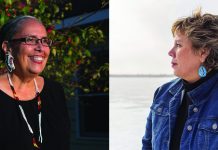
Heimerl (LEft) and Taylor (right) All Photos Courtesy of Honeywell Educators Space Academy
Minnesota teachers Kinga Taylor of Lions Gate Academy in Crystal and Beth Lynn Heimerl of Oak View Middle School in Anoka were two of 224 teachers from 35 countries and 45 U.S. states and territories selected to attend the Honeywell Educators Space Academy (HESA), a rigorous five-day space camp hosted annually hosted annually by the U.S. Space and Rocket Center in Huntsville, Alabama in June.
The goal of the program is to re-energize teachers and showcase new ideas and concepts for them to incorporate into their curriculums in order to inspire their students to seek out careers or interests in STEM fields.
“Part of being a teacher is like a performance,” Kinga Taylor said. “You need to be excited about what you are teaching because if you have passion for what you are doing then your kids will be excited about it too.”
HESA was created in 2004 as a part of the Honeywell Hometown Solutions, the company’s citizenship initiative that addresses the needs of the greater community by providing resources and financial support to those in need through employee volunteerism in the area. The program consists of five main focuses: Science and math education, family safety, housing, habitat and conservation, and humanitarian relief.
As a foundational component to their community mission, Honeywell believes that the need and encouragement of STEM education is important. It gives the students the opportunity to learn how to be problem solvers and with the growing population of students there is potential for them to solve critical needs relating to issues of housing, infrastructure, transportation and farming for the future generations to come.
“We are not the generation going to mars but the generation that we are teaching is,” Taylor said. “The mark that we leave on students in our classroom now can be the ones to shape the future.”
STEM education is no longer strictly memorizing scientific facts and learning mathematical equations. The field taps into all parts of the brain and incorporates not only mathematics, but a culturally global awareness of communication and creativity as well. With that, the program at HESA invests in the teachers in order to help them to improve their teaching techniques, create more well-rounded course curriculum and ultimately motivate their students to reach their fullest potential.
Heimerl said that students and teachers often get stuck doing what they already know, which is why it’s so necessary for them to expand beyond their comfort zones. By encouraging students to try new things, they will address new ways of thinking.
“It is important for students to realize that they have to be willing to fail to move forward,” Beth Lynn Heimerl said. “We need to help them try and engage in the process of trial and error, develop problem solving brains and persevere.”
In just the last decade alone, employment in STEM occupations have grown much faster in the employment of non-STEM occupations—24.4 percent versus 4 percent respectively—and according to the Department of Commerce, the STEM occupations are expected to grow by 8.9 percent between 2012 and 2024 according to Director of Honeywell Hometown Solutions Kerry Kennedy.

The five-day camp consists of 45 hours of classroom and laboratory instruction focused on coding, science, space exploration and leadership skills development.
The program not only promotes a growth in learning for the teachers, but it builds a network of peers that can further reach goals and collaborate from all across the globe.
“When I was there I didn’t feel like I was the only geek,” Heimerl said. “It was neat to see all of these people together sharing the same passion.”
Since 2004, more than 3,000 teachers from 62 countries and 52 U.S. territories have attended this progressive program.
In order to attend, HESA candidates complete a rigorous application process. To be eligible, certified educators must be teaching science or math to students between the ages of 10-14 years old through either a public or private school system. If accepted, the program also offers scholarships to qualified teachers that cover tuition for the five-day program at the U.S. Space and Rocket Center, round-trip airfare, meals and accommodations, program materials and a flight suit.
Through HESA, these selected educators from around the world are able to build a strong network of peers to collaborate with in order to facilitate the growth of the future of our world.
“I want to show my students that learning doesn’t stop after you graduate,” Heimerl said.






